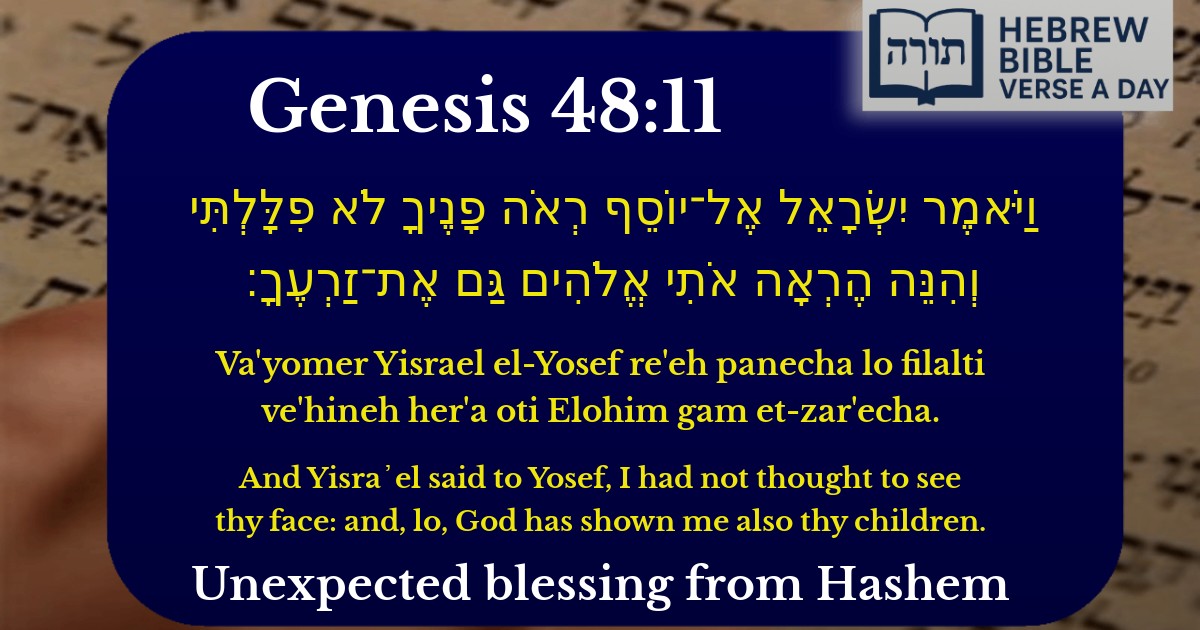Frequently Asked Questions
Q: What does Yaakov mean when he says 'I had not thought to see thy face'?
A: Yaakov (Yisrael) is expressing his deep emotion and gratitude to Hashem for reuniting him with his son Yosef, whom he thought was dead for many years. According to Rashi, Yaakov never expected to see Yosef again after he was sold into slavery, making this reunion a miraculous moment.
Q: Why is Yaakov's statement about seeing Yosef's children significant?
A: Yaakov's mention of seeing Yosef's children highlights the fulfillment of Hashem's promise to make his descendants numerous. The Midrash explains that this was a special blessing, showing that Yosef remained righteous even in Egypt and merited to have children who would carry on the legacy of the Jewish people.
Q: What lesson can we learn from Yaakov's words to Yosef in this verse?
A: This verse teaches us about the power of gratitude and recognizing Hashem's kindness. Even after years of suffering, Yaakov acknowledges the miracle of being reunited with his son and grandchildren. The Rambam teaches that recognizing and thanking Hashem for our blessings is a fundamental aspect of Jewish faith.
Q: How does this verse connect to the theme of family in the Torah?
A: This moment between Yaakov and Yosef emphasizes the importance of family unity and the joy of reconciliation. The Talmud (Berachos 5a) teaches that family bonds are sacred, and repairing relationships is a great mitzvah. Yaakov's emotional reunion with Yosef sets an example for future generations.
Q: Why does Yaakov mention that Hashem showed him Yosef's children?
A: Yaakov recognizes that seeing Yosef's children was a divine gift, not just a coincidence. According to the Sforno, this was a sign that Hashem's promise to Avraham, Yitzchak, and Yaakov—to make their descendants like the stars—was being fulfilled through Yosef's offspring, even in exile.


Yaakov's Emotional Revelation
The verse (Bereshit 48:11) records Yaakov's emotional declaration to Yosef after their reunion in Egypt. Rashi explains that Yaakov had given up hope of ever seeing Yosef again after his disappearance, as he assumed Yosef had perished or been killed. The phrase "לֹא פִלָּלְתִּי" ("I had not thought") reflects Yaakov's complete resignation to this painful reality.
Divine Providence in Reunion
The Midrash (Bereshit Rabbah 94:5) highlights how Yaakov attributes this miraculous reunion to Divine intervention. When Yaakov says "הֶרְאָה אֹתִי אֱלֹהִים גַּם אֶת־זַרְעֶךָ" ("God has shown me also thy children"), he acknowledges that seeing not only Yosef alive but also his grandchildren was beyond natural expectation. The Kli Yakar emphasizes that this was a double miracle - both Yosef's survival and his flourishing in Egypt.
The Significance of Seeing Future Generations
Rabbeinu Bachya notes that Yaakov particularly values seeing Yosef's children because:
Spiritual Interpretation
The Sforno offers a deeper dimension, suggesting that Yaakov's statement reflects his recognition that this reunion had cosmic significance beyond personal joy. Seeing Yosef's children represented the future redemption of Israel, as the descent to Egypt was part of the Divine plan leading to the Exodus.
Grammatical Insight
Ibn Ezra analyzes the unusual verb "פִלָּלְתִּי", explaining it derives from the root meaning "to hope" or "to expect," emphasizing how Yaakov had completely abandoned any expectation of this reunion. The Malbim adds that the phrasing indicates Yaakov had stopped even praying for this outcome, making the reality all the more miraculous.